Key takeaways:
- Soul music originated from the African American experience, blending gospel, rhythm and blues, and jazz, reflecting themes of struggle, resilience, and hope.
- Influential artists like Aretha Franklin, Marvin Gaye, Otis Redding, and Stevie Wonder shaped the genre, using their music to address societal issues and convey deep emotions.
- Key albums in soul music, such as Marvin Gaye’s “What’s Going On” and Aretha Franklin’s “Lady Soul,” are essential for understanding the genre’s emotional depth and breadth.
- Live soul music events foster a unique communal experience, allowing audiences to connect deeply with the music and each other through shared emotional moments.
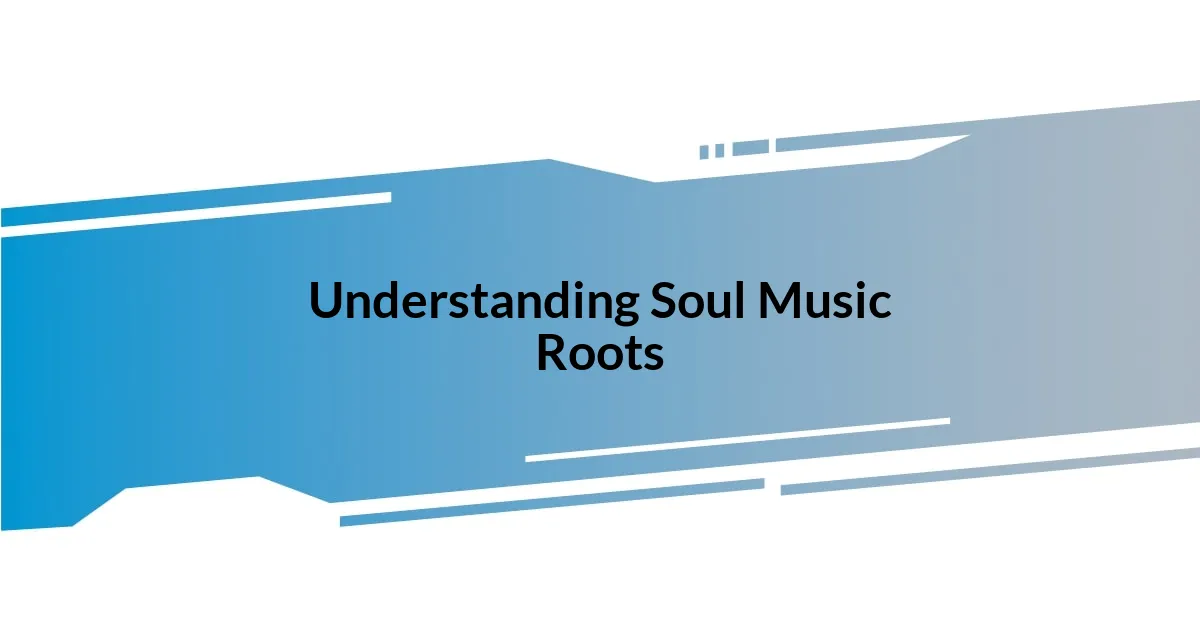
Understanding Soul Music Roots
Soul music has deep roots that trace back to the African American experience in the United States, blending elements of gospel, rhythm and blues, and jazz. I remember the first time I heard Sam Cooke’s “A Change Is Gonna Come.” It struck a chord in me, making me realize how this genre was not just music; it was an expression of struggle, resilience, and hope. How could a song encapsulate such profound emotions? That’s the magic of soul music.
As I delved deeper, I learned about the Great Migration, where countless African Americans moved to cities like Chicago and Detroit in search of a better life. This transition profoundly influenced the sound of soul music, merging traditional spirituals with urban beats. I can almost feel the energy of those bustling streets while listening to songs from that era. It’s fascinating to think about how their realities shaped the very fabric of the music I cherish.
Moreover, the emergence of independent record labels in the 1960s played a pivotal role in redefining soul music. Artists like Aretha Franklin and Otis Redding found their voices in these creative spaces, allowing them to express their authentic selves. I’ve often wondered, what would soul music have looked like without these pioneers? Their groundbreaking work continues to inspire generations, rooting us all in a shared narrative of love, pain, and triumph.
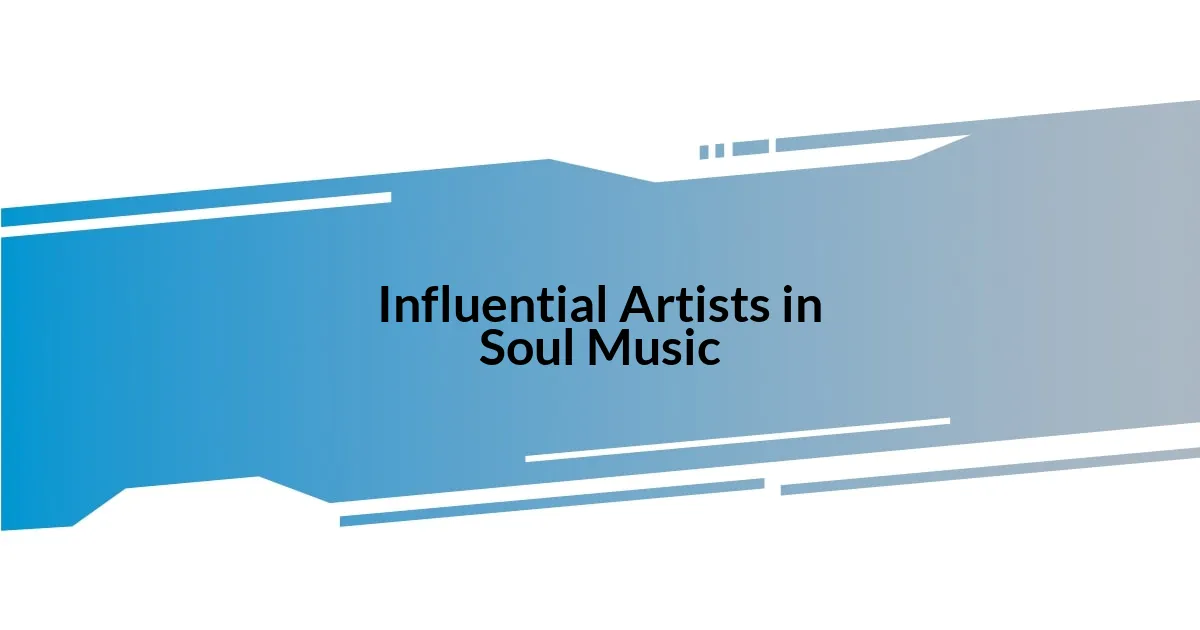
Influential Artists in Soul Music
When I think of influential artists in soul music, names like Aretha Franklin and Marvin Gaye immediately come to mind. Aretha, known as the “Queen of Soul,” had an unmatched ability to convey raw emotion through her voice. I recall listening to “Respect” for the first time—it was electrifying! The way she commanded the song made me realize how powerful soul music can be as an anthem for empowerment and change. Marvin Gaye’s “What’s Going On” further deepened my appreciation for the genre, blending social consciousness with melodic beauty. It’s an incredible feeling—knowing these artists used their platforms to address societal issues while creating music that resonates even today.
Then there’s Otis Redding, whose passionate delivery in songs like “Sittin’ On The Dock of the Bay” has always captivated my heart. His ability to evoke feelings of longing and nostalgia reminds me of quiet afternoons spent reflecting, listening to the waves crash. Otis embodies the essence of soul—raw, emotional, and deeply personal. Each time I hear his music, I’m transported back to those moments, feeling a connection that transcends time and experience.
Finally, I can’t overlook the impact of Stevie Wonder, whose innovative sounds often broke genre barriers. His album “Songs in the Key of Life” is a cornerstone in music history, blending soul with elements of funk and pop. Listening to “Isn’t She Lovely” still brings me joy, reminding me of the magic of love that he so beautifully captures. Don’t you ever feel that way too? It’s astonishing how these artists have each, in their unique way, shaped the landscape of soul music while touching our lives in profound ways.
| Artist | Key Song |
|---|---|
| Aretha Franklin | Respect |
| Marvin Gaye | What’s Going On |
| Otis Redding | Sittin’ On The Dock of the Bay |
| Stevie Wonder | Isn’t She Lovely |

Key Albums to Explore
When exploring key albums in soul music, I can’t help but be drawn to Marvin Gaye’s “What’s Going On.” The first time I listened to this album, the blend of poignant lyrics and soothing melodies washed over me like a warm embrace. It felt as if Gaye was having an intimate conversation with me about love, war, and social justice. Another album that stands out is Aretha Franklin’s “Lady Soul.” Hearing her powerful voice belt out tracks like “Ain’t No Way” and “Chain of Fools,” I felt an overwhelming sense of empowerment—it’s as if she could reach deep into your soul and pull out your innermost feelings.
Here are some other pivotal albums that are a must-explore for any soul music aficionado:
- Otis Blue: Otis Redding Sings Soul by Otis Redding
- Songs in the Key of Life by Stevie Wonder
- Soul on Fire by Betty Wright
- Innervisions by Stevie Wonder
- Stand! by Sly and the Family Stone
Each of these albums represents a unique voice and perspective within the genre, offering a different facet of the multifaceted world of soul music. The emotions conveyed in these records linger long after the last note fades, making them essential explorations for anyone wanting to understand the depth and richness of this art form.
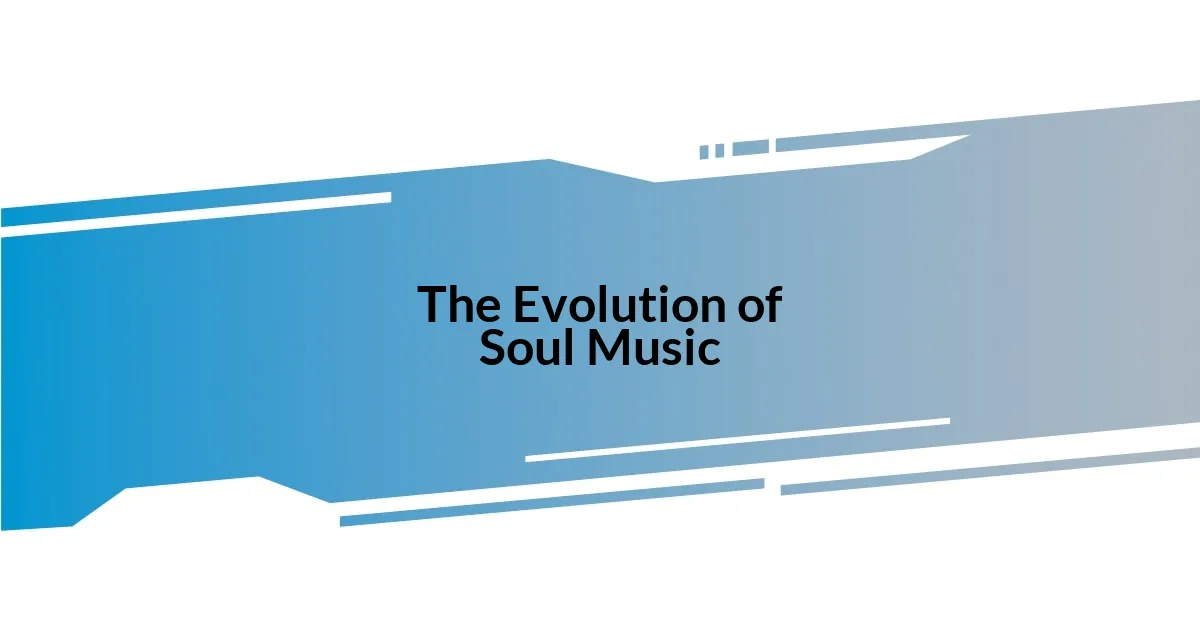
The Evolution of Soul Music
Soul music has evolved significantly since its roots, drawing from gospel, rhythm and blues, and jazz. I remember the first time I stumbled upon Ray Charles’ work; it was like an awakening. His blend of heartfelt lyrics and vibrant melodies made me realize how deeply these genres can intertwine to create something fresh and meaningful. Isn’t it fascinating how the past influences the present in music?
As the genre progressed, the sound expanded. In the 1970s, artists like Al Green infused soul with a spicy blend of funk and pop, giving rise to a new, danceable energy. I can almost hear the groove of “Let’s Stay Together” pulsing in the background as I reminisce about energetic gatherings where everyone would lose themselves in the rhythm. It’s remarkable how soul music serves as a bridge connecting generations, inviting listeners to explore joy and vulnerability alike.
Today, we see soul music continuing to transform with artists like Leon Bridges and H.E.R., who blend traditional elements with contemporary influences. This evolution doesn’t take away from the genre’s roots but enriches it, fostering a beautiful dialogue between the old and the new. When I listen to Bridges’ “Coming Home,” there’s this nostalgic vibe that resonates within me, reminding me of the timeless essence of soul. How incredible is it that the heartbeat of this music still echoes through today’s sounds?
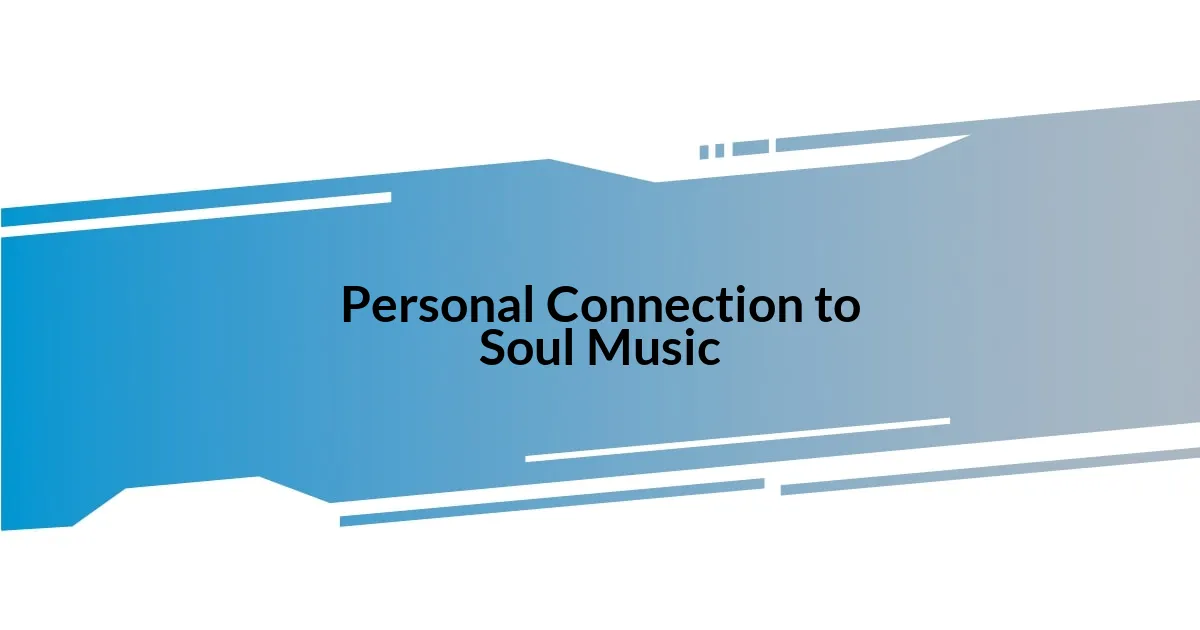
Personal Connection to Soul Music
Soul music has always felt like a personal soundtrack to my life. I vividly remember driving on a warm summer evening, the sun setting just right, when Etta James’ “At Last” filled the car. It was as if her voice spoke directly to my heart, intertwining with my memories of love and longing, making even the quiet moments feel monumental. The emotional rawness of soul music has a way of connecting us to our deepest feelings.
Listening to soul music often feels like a shared experience, even when I’m alone. I can’t count the nights I’ve spent indulging in the smooth sounds of Al Green while cooking dinner, the lyrics serving as a backdrop to my thoughts and emotions. There’s something incredibly powerful about how these songs resonate, reminding me of life’s beautiful complexities. Have you ever found yourself singing along to a refrain and just letting go? That’s the magic of this genre; it enables us to embrace joy, sorrow, and everything in between.
One particular memory stands out to me—dancing with friends to Sam Cooke’s “A Change Is Gonna Come” during a gathering. The room felt electric, infused with both nostalgia and hope. It was in that moment I realized that soul music isn’t just an escape; it’s a powerful reminder of the struggles and triumphs we all experience. This deeply personal connection continues to foster not just feelings of belonging, but also an understanding that we are part of something much larger than ourselves.
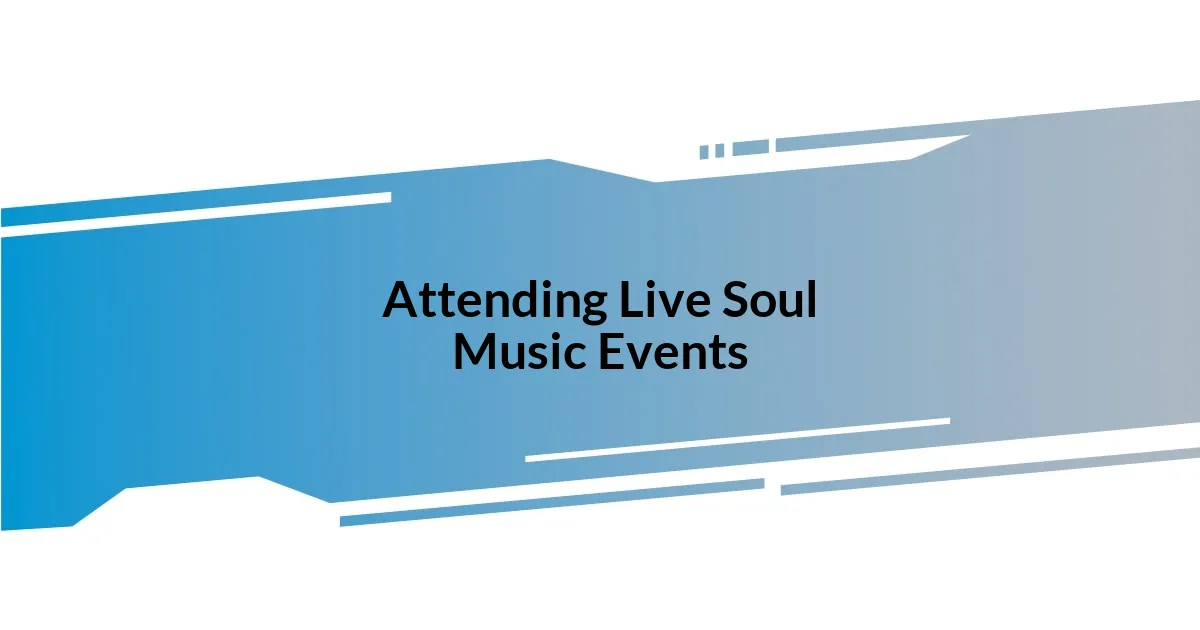
Attending Live Soul Music Events
Attending live soul music events is an experience that can take you to another realm. I remember my first concert—seeing a tribute band honoring legends like Aretha Franklin and Otis Redding. The moment they hit that first note, I felt an exhilarating rush coursing through the crowd, a collective heartbeat syncing to the rhythm of familiar melodies. Isn’t it incredible how music can turn strangers into friends, united under a shared love for soulful tunes?
The atmosphere at these events is electric; it’s more than just watching performers on stage. I often find myself lost in the moment, standing shoulder to shoulder with others, swaying and singing along. There’s an undeniable connection in the air, an unspoken understanding that we all came seeking that powerful combination of joy and nostalgia. I recall one night when the artist invited the audience to join in on “Ain’t No Mountain High Enough,” and we all erupted in unified harmony, transforming the venue into a soul-filled sanctuary. Can you remember a time when the music made you feel like you belonged?
There’s something magical about seeing musicians pour their hearts out live. I distinctly remember watching a local artist belt out a heartfelt rendition of “Still Ain’t Over You.” At that moment, I could see the raw emotion in their eyes, and it drew me in completely. As tears streamed down my face, I felt a profound connection—not just to the performer but also to everyone around me, each of us processing our own stories through the power of soul music. It’s moments like these that remind me why I keep coming back to live events; they create a space where vulnerability meets joy, and we’re all there to experience it together.